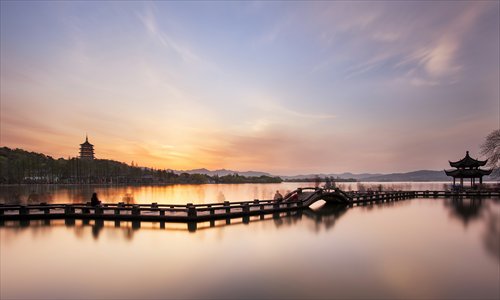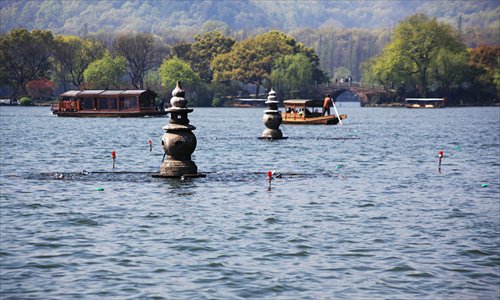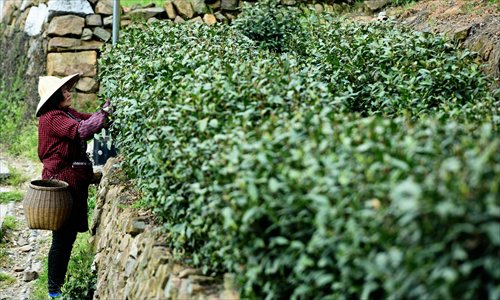HOME >> LIFE
A visit to the city of Hangzhou
By Liu Xin Source:Global Times Published: 2016/6/24 5:03:03

A view of West Lake with the Leifeng Pagoda in sight Photo: CFP
Whenever my friends ask me about which city I like the most in China, my answer is always the same - Hangzhou.Although I was born in a small city in North China and spent six years studying in two cities in South China, it only took two trips to the capital of East China's Zhejiang Province to have me fall in love with the city. That is amazing.
It's a bit difficult to describe the charm of Hangzhou to someone who has never been there. As soon as you step into the city you'll find yourself immersed in its picturesque scenery as well as its history and cultural heritage.
The beauty of one of the city's most famous areas, the West Lake, has been an inspiration to artists and poets for centuries. As early as the Tang Dynasty (618-907) poet and government official Bai Juyi wrote two poems mentioning the lake.
"Bestowed on guests as returning from West Lake in the evening and looking back to Gushan Temple," goes the title of one of Bai's poems.
Mentions of the West Lake can be widely seen in the poetry written during the Northern Song Dynasty (960-1127).
The city's scenery has continued to influence numerous poets and painters throughout Chinese history, including the Northern Song Dynasty's Su Shi who praised West Lake as a beauty "who is always charming in either light or heavy makeup."
The West Lake has 10 famous scenic spots scattered around the lake. Each of these scenic spots carry poetic names such as "Exploring Plum Blossom at Ling Peak," "Fishing Viewing at the Flower Pond" and "Orioles Singing in the Willows."
One of the most famous of these scenic spots is the "Three Ponds Mirroring the Moon." It is known throughout China because a picture of the three small stone pagodas sitting in the lake that make up the spot is printed on the back of the fifth version of one yuan bill of RMB.
It is quite an experience to wander around West Lake and see the fog enshroud the artificial islands within the lake in the morning or admire the setting sun as it gilds the Leifeng Pagoda in the hill besides the lake at dusk.
The most wonderful thing is that many of these scenic views give off different feelings depending on the time of day or the weather.
I highly recommend you rent a bicycle to circle around the West Lake so you can take your time soaking in the scenery.
Don't worry about the price when it comes to the bikes. The first hour is free, so you can return your bicycle to any station nearby after 59 minutes and change it for a new one for another one-hour free tour.

Two of the three pagodas that make up the Three Ponds Mirroring the Moon Photo: CFP
A tale of romanceA city that only has beautiful scenery on its side may impress people the first time they arrive, but eventually the more finicky will become bored. However, a city that is full of stories, especially romantic stories, will continue to make an impression on people's memory.
The affairs of Helen and Paris not only added some romance to the epic 10-year siege of Troy recorded in The Iliad but also helped the name of the city leave an indelible mark on the pages of history.
Hangzhou is no exception. One of its most famous stories involves the intertwined fates of a human being and a snake.
The story begins when a boy named Xu Xian saves a white snake who has been practicing the mystical arts in the hope of becoming immortal.
Wanting to repay his kindness, the white snake transforms into a woman named Bai Suzhen and heads to Hangzhou together with another young lady, Xiaoqing, who transformed from a green snake, to find Xu.
The three come across each other on the Broken Bridge that runs across the West Lake on a rainy day.
Xu, who doesn't know Bai's identity as a snake, is such a gentleman that he lends his umbrella to the two women and walks away in the pouring rain. This only serves to increase Bai's fondness for him.
After running into each other on several different occasions (Bai and Xiaoqing actually use some of their magic to accomplish this), Xu comes to believe that he and Bai are fated to be together. The two eventually marry and run a medicine shop in Hangzhou.
Their happy marriage life is interrupted by a monk named Fahai who knows Bai and Xiaoqing's identity and believes that Bai and Xiaoqing will eventually kill Xu.
Fahai approaches Xu and reveals Bai's identity several times. Although Xu does not believe Fahai that his virtuous wife is not a human being, he still tricks Bai into drinking realgar wine during the Dragon Boat Festival as Fahai instructed.
The wine causes Bai to return to her original form, which is so shocking for Xu that he dies.
In order to save her beloved, Bai travels to Mount Emei and steals a magical herb that later restores Xu to life.
Although he now knows his wife's true identity, Xu is still steadfast in his love for Bai.
Fahai, however, continues in his efforts to separate the star-crossed lovers by capturing Xu and imprisoning him in Jinshan Temple.
Bai and Xiaoqing attempt to rescue Xu, but during the fight with Fahai, Bai uses her power to flood the area near the temple, which ends up drowning thousands of innocent people.
Bai soon runs out of power since she is about to give birth to Xu's child. She is imprisoned in Leifeng Pagoda to atone for her crime of killing innocent people.
Burdened by guilt because so many died for him, Xu heads to Jinshan Temple to pray for the deceased.
The two don't see each other for the next 18 years but their love for each other doesn't fade since they can feel each other's presence across the West Lake.
This tale has delighted countless Chinese throughout history drawing many of them to make the pilgrimage to the West Lake to see the beauty of the area for themselves.
The bridge and Leifeng Pagoda count among the 10 famous scenic spots around the lake - "Remnant Snow on the Broken Bridge" and "Leifeng Pagoda in the Sunset."
I once spent more than half an hour walking around the Leifeng Pagoda, looking for a hint that a beautiful lady who was once a snake had been kept there for decades.
The stones remained silent, but a few sentences written by Aaron Shepard, who retold the tale in his book Lady White Snake popped into my mind - "Tales of China tell us that all things may grow and change. A stone may become a plant. A plant may become an animal. An animal may become a human … Just so, a snake may become a woman. And we are told of one who did."

A woman picks tea leaves in Longjing village. Photo: IC
Outside the cityAside from the West Lake and the tale of the white snake, visitors may want to enjoy some time away from downtown.
A trip to Longjing village, where the famous Longjing tea - or dragon well tea - is produced, may be an excellent choice for tourists.
It can be a lot of fun to sit in an outdoor teahouse near a tea garden, sipping Longjing made by professionals and trying to learn some tips for making the best tea.
Visitors can also go tea leaf picking themselves during the prime tea harvest season from March to the end of summer.
Another attraction not too far from downtown is Lingyin Temple, one of the largest and wealthiest temples in China.
One of my friends told me that local residents and people across the nation come to the temple because it is effective in granting wishes.
I am not a believer and don't have any aspirations that need the assistance of the Buddha, but I do like the sound of the temple's brook as it runs through the mountains or the birds twittering in the groves.
In addition, the Xixi National Wetland Park is to the west of Hangzhou and has become a major destination for many Hangzhou residents on vacation.
The park has been praised as a "wetland paradise" with more than 70 percent of the area covered by water.
Waterways, wild weeds and waterfowl number among the things to see near the park, as is the modern museum displaying the daily life of ancient fishermen and farmers.
There are so many stories and scenic spots in and near Hangzhou that they couldn't possibly be included in one article. My hope is that you will take a trip to the city to see it with your own eyes.
As for me, I dream of living along the West Lake just like Su Shi once described, "From now on I would vanish with my little boat, for the rest of my life on the sea I would float."
Newspaper headline: Poetic inspiration
Posted in: Feature